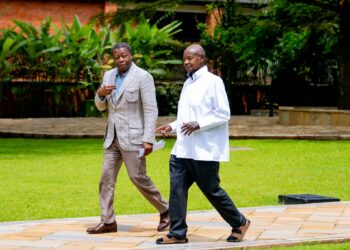Dfcu bank has denied claims that it will be closing some of its branches across the country.
Over the weekend, media reports stated that the commercial bank was in a move to close 22 of its branches starting October 14, 2019.
However, according to a statement issued on Sunday, dfcu said, “The Bank wishes to clarify that the purported notice in respect to branch closures is false and did not originate from dfcu Bank.”
The bank which has a network of 63 branches across the country further revealed that they are in the process of implementing their digital strategy to drive better customer experience, improve efficiency and align their operations with emerging trends in the financial sector.
“This calls for continuous rationalization of branch operations and redesigning of the Branch model.
“The Bank has, in the last two years, enhanced some and introduced new alternative delivery channels like Agent banking, Online Banking and Mobile banking to support its digital agenda. dfcu will continue to align the Branch network to leverage these alternative channels,” the management stated.
Vacating 22 Branches
What remains a fact is that the bank has considered vacating 22 buildings which belong to businessman Sudhir Ruparelia and his Meera Investments Limited.
The embattled bank has been operating its business in buildings/properties belonging to Meera Investments Limited since it acquired Crane Bank Limited in January 2017. But Sudhir has been challenging the transfer of these properties to dfcu which took over Crane Bank.
Background:
A city law firm Sebalu & Lule Advocates misled dfcu bank to illegally transfer the leasehold titles that belong to Meera Investment Limited.
In a leaked memo, the law firm offered legal advice to the commercial bank informing it to go ahead and transfer into its name, the 46 properties it acquired in the controversial takeover of Crane Bank.
Between 2012 and 2016, Meera leased the 46 properties to Crane Bank on different terms with the leases being duly registered as encumbrances on Meera’s freehold and mailo interest.
The lease titles were subsequently processed and issued to Crane Bank.
Crane Bank agreed to pay $6,000 as ground rent for each of the properties effective on or before the January 1, of every year to the property owners (Meera Investments).
Meera had also agreed with Crane Bank under various lease agreements that in case of any breach, non-performance, or non-observance of what they had agreed on in the lease agreements, it will be lawful for Meera to seek legal redress from court.
“It was further agreed between the plaintiff [Lessor] and Crane Bank [Lessee] that anything done contrary to the terms of the lease agreements would forthwith cease the lessee’s rights or interest in the suit properties without prejudice to the lessor’s entitlement to rent unpaid and due,” Meera claims.
With the agreements in place, on October 20, 2016, BoU took over Crane Bank under statutory management.
On January 24, 2017 Bank of Uganda announced that it had transferred all the assets and liabilities of the bank to dfcu Bank.
Dfcu Bank, which was the new tenant then moved to take over the 46 properties, without the consent of the owners Meera Investments.
The document titled Transfer of former Crane Bank household properties, dated May 8, 2017, “the law firm skipped important aspects of the law including the fact that banks are not allowed to invest in business for fear of conflict of interest with their clients, apart from their main premises” banking analysts say.
“In light of the lengthy of time between the completion of date and when dfcu can vividly exercise the option to rescind the purchase of household properties, our recommendations is that the transfer be registered immediately,” reads an excerpt from the leaked document.
Sebalu & Lule told dfcu that “our opinion is that although the proposed approach of registering caveats provides dfcu with some level of legal protection , its indisputable title to the leasehold properties can only be guaranteed through registration of the transfers executed by BoU in favour of dfcu.”
The lawyers also said 24 months was too long a time to wait, for BoU to resolve ownership issues.
Do you have a story in your community or an opinion to share with us: Email us at editorial@watchdoguganda.com









